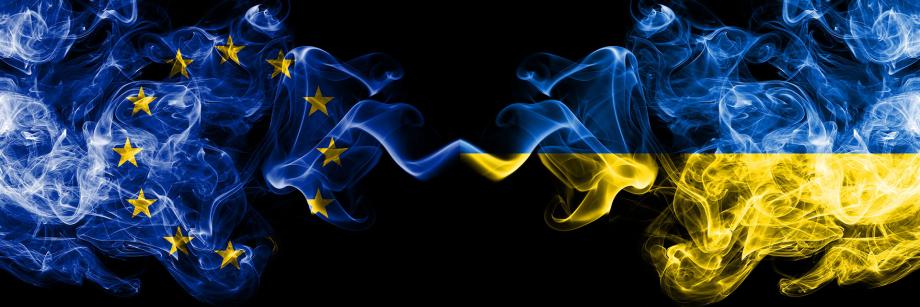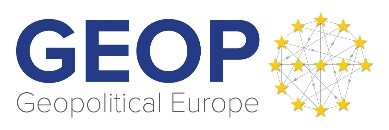Will Ukraine join the EU? A special case of strategic importance to the EU

Had the EU leaders not taken a strategic decision in 1976 the future of democracy in Greece would be uncertain as well as its geopolitical orientation. The same applies to Ukraine now.
The Russian invasion of Ukraine has created several unexpected outcomes. One of them is the acceleration of Ukraine’s integration with the Euro-Atlantic Community. Ukraine officially applied for immediate EU membership on the fourth day of the Russian onslaught, on 28 February 2022.
On 10 March 2022, an extraordinary meeting of the European Council (the gathering of EU leaders) in Versailles ‘acknowledged the European aspirations and the European choice of Ukraine’ although stopped short of offering Ukraine official EU candidate status. However, despite this shortcoming, Ukraine’s future in the EU seems solid now.
The Process
The usual EU accession process is lengthy, difficult, and unpleasant though it is essential for the nation’s modernisation and its security. Ukraine is right at its outset, and it is joining the process at a tragic moment, as a country at war fighting for its national survival. The Visegrad nations: Czechia, Hungary, Poland and Slovakia filled for membership in 1994 but they had to wait three years to be recognised by the EU as candidate states and another seven to actually join the EU.
So, the whole process took no less than ten years. Ukraine clearly doesn’t have the luxury of waiting that long for the decision of the EU. It is therefore clear that if the EU is seriously considering this application, it must treat it outside the box of its usual lengthy and bureaucratic procedures.
To some extent this is what happened at the EU meeting at Versailles, though, Kyiv was disappointed with the outcome. It was, for example, unusual for the EU to deliberate an application of the state that only just applied and to go to some length to encourage the European choice of Ukraine by clearly stating that the country ‘belongs to our European family.’
The European Council’s communication has also stressed that the leaders asked the EU Commission to deliver its opinion — the so-called ‘avis’ — on the Ukrainian application. Usually, the applicants were waiting for months for the European Council to take this step, which in this instance happened almost instantly.
Yet the EU leaders failed to grant Ukraine an immediate status of a ‘candidate state,’ as requested by Kyiv. Despite intense lobbying from Poland, Slovakia and the Baltic States, the European Council also failed to agree to make a reference to article 49 of EU treaties, which specifies that ‘Any European State which respects the values referred to in Article 2 (democracy, human rights and the rule of law) and is committed to promoting them may apply to become a member of the Union.’
However, Central European states managed to score a small victory here as the final communication from the summit makes a reference to ‘the relevant treaties’ whilst addressing Ukraine’s bid to join the EU.
Overall, the outcome is ambivalent although considerably short of Ukraine’s expectations. There is no doubt that Kyiv’s graduation to an applicant and a potential candidate for membership within such a space of time is revolutionary for the EU. Before the Russian invasion the prospects of Ukraine’s EU membership were considered very distant and a matter of geopolitical fantasy. Then within the space of just a few days, the prospects of Ukraine’s EU membership are far more promising than Turkey’s, which applied in 1987 and has been recognised as a candidate in 1999.
But what may seem revolutionary for the EU is disappointing for a country that defends European borders and is making daily sacrifices of human life because of its European choice. It is indeed most disappointing that the EU leaders did not send a clearer signal to Ukraine by, for example, granting it an immediate candidate status, a step with no immediate practical consequences. As argued by a number of Central European leaders, for example, the Slovak foreign minister Ivan Korcok this was due to the fundamental failure of imagination and a triumph of egocentric bureaucratism on the part of some European states.
Reluctance
Ukraine can rely on a large club of champions of its application, which include Bulgaria, Czechia, Estonia, Hungry, Latvia, Lithuania, Poland, Romania, Slovakia, and Slovenia. Practically all ex-communist states, except for Croatia, strongly support Kyiv’s application. Two west European states, Denmark and the Netherlands are, however, most reluctant, leading the charge against granting Ukraine candidate status and giving it a clear European perspective.
Other European states, such as France and Germany are ambivalent. They understand Ukraine’s strategic importance and feel a moral obligation to support it. Yet the diplomatic corps from Berlin and Paris are determined Europhiles who view the enlargement process with suspicion if not outright hostility.
Ukraine’s bid for membership is additionally complicated by the fear of creating precedence, which would ultimately force the EU to open to a much larger number of countries. After all, the EU recognised five states as EU candidates: Albania, North Macedonia, Montenegro, Serbia and Turkey and is already engaged in membership negotiations with this group some of which — such as Turkey or Serbia — are unlikely to be ever allowed in. Following Ukraine’s application, two other ex-Soviet states Georgia and Moldova have also decided to apply.
There is much fear in the EU that letting all these states in would make the Union unwieldy and could lead to its break-up. Amongst the reasons why the Netherlands and Denmark are the main opponents of granting Ukraine the European perspective is the negative perception of the recent enlargements in those countries. The Netherlands and Denmark are leading the so-called club of ‘frugals,’ the states who consider the enlargement to be an expensive enterprise that undermines the cohesion of the union.
The Way-forward for the EU
Opening the EU to Ukraine requires strategic foresight and political courage. It is, to some extent, understandable that Western Europeans are worried about opening the EU to a host of West Balkan and East European states. There is no denying that the EU still struggles to digest 2004, 2007 and 2013 enlargements, which have doubled the number of member states, none of which is a net contributor to the EU budget. However, Ukraine must be seen as a special case of geopolitical importance to the EU and as such it must be treated differently.
After all, the well-being of the EU depends on the security of its borders in particular to the East, which are currently threatened. There is no better guarantee of the security of this border than the existence of free and pro-western Ukraine. This outcome can only be secured through the process of expanding the process of EU integration to Ukraine. In the past, the EU proved capable of taking strategic decisions outside the confines of bureaucratic logic.
For example, in 1976 EU leaders overruled the Commission and decided to open the process of accession negotiations to Greece, which has only started coming out of a right-wing dictatorship. Had the leaders not taken this strategic decision the future of democracy in Greece would be uncertain as well as its geopolitical orientation. In the late 1970s, the Cold War was still raging, and the threat of Soviet invasion was very real. Today, we have a new Cold War and Russia is very close to posing a direct threat to EU territory. Times are calling for extraordinary measures and recognition of Ukraine’s sacrifice and its importance to European security.
*This article was originally published 16 March 2022 in Visegrad Insight: https://visegradinsight.eu/will-ukraine-join-the-eu/
*The article is part of GLOBSEC GEOPE—Geopolitical Europe: Are the Member States Ready for It? Project supported by Jean Monnet Actions of the EU’s Erasmus+ program. The European Commission support for the production of this publication does not constitute an endorsement of the contents which reflects the views only of the authors, and the Commission cannot be held responsible for any use which may be made of the information contained therein.
*This article is part of an ongoing media cooperation in Central Europe organised by Visegrad Insight, involving Denik.cz, DennikN.sk, Onet.pl and Telex.hu. The European Parliament was not involved in the preparation of the materials and shall not be liable for information or positions expressed by the authors. To see more articles from this project, click here.



